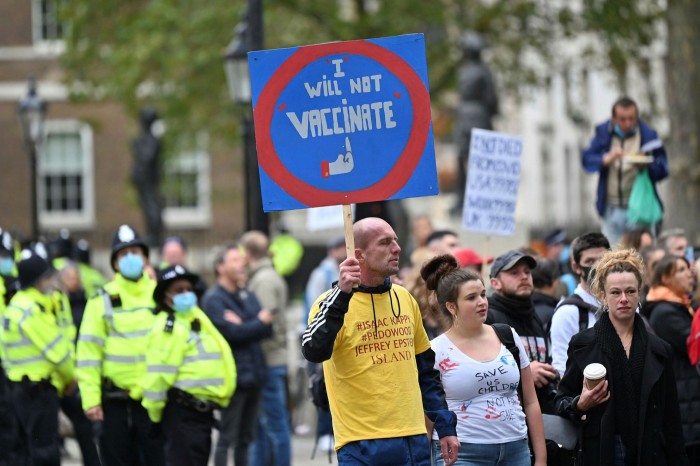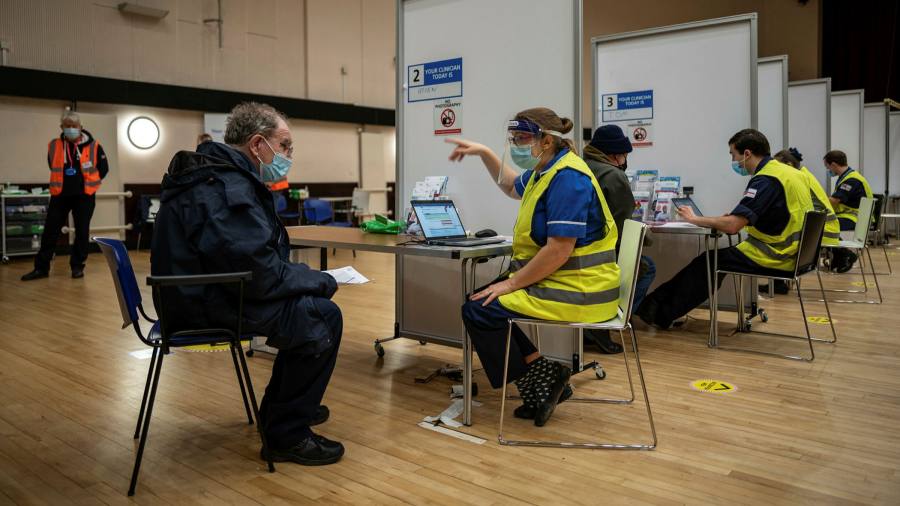[ad_1]
Kathy Heffernan, a train driver, emerged from the vaccination centre in Brighton grateful to have received her first Oxford/AstraZeneca injection and grateful that — at least on this aspect of its handling of the coronavirus pandemic — the UK government has been on the front foot.
“I am not a supporter of Boris Johnson [the UK prime minister], but he did a great thing by taking a punt and getting his hands on several vaccines,†she said. By contrast, Europe — and like a majority in the south-coast city she was a supporter of EU membership back in the 2016 referendum — was playing politics with lives, she said. “It’s very odd. They are frightening their own people against getting the vaccine.â€
In the UK, questions in Europe over the safety of the vaccine, the suspension of its rollout last week and a parallel war of words between Brussels and London on the export of coveted supplies have baffled supporters of the EU and Brexiters alike.
“If Europe wants to win this argument with other populist parties that might want to follow Britain’s path, they need to work out a better strategy,†said Tom Baldwin, former communications and strategy director for the opposition Labour party and a leading figure in the 2019 campaign for a second UK referendum on EU membership. “The EU is in danger of losing the moral high ground, allowing themselves to be presented as incompetent and undemocratic.â€
The UK government’s early investment in research and procurement last year, before any of the vaccines in development had proved effective, gave Britain a head start once regulators approved the AstraZeneca and BioNTech/Pfizer jabs. The EU opted to procure vaccines as a bloc rather than as individual states, and its medical agency was slower to provide approvals.
Tensions between Britain and Brussels have since intensified, with more than 27m now having received their first vaccine injection in the UK — second only to Israel as a proportion of its population — while the EU programme has stumbled amid supply constraints and a third wave of the pandemic looming.
Meanwhile, questions over a possible link between the vaccine and blood clots have arisen in several EU countries, prompting some member states to suspend the rollout out of caution. The European Medicines Agency on Thursday deemed the vaccine “safe and effective†and France, Italy, Germany and Spain resumed vaccination. But rollout in Norway, a non-EU state, Denmark and Sweden remains on hold and France’s health agency later recommended it not be given to people under 55.
“You could extrapolate and say we are proving more nimble,†said Ed Derby, a sound engineer who had also just received his jab in Brighton. “This has confirmed my feelings. I am glad we are out [of the EU].â€

The dispute has handed Johnson’s government a public relations victory after months of negative press about the UK’s high coronavirus death toll — which stands at around 126,000 and is among the highest per capita in the world. Brexiters, who might otherwise have struggled to defend their cause after a collapse in trade with the EU since Britain left the block in January, are feeling vindicated.
“Because they are pissed off that we got there ahead, and that goes against their brief that Britain made a bad decision [in leaving the EU], the EU are trying to generate fault with us,†said Sir Iain Duncan Smith, a former leader of the ruling Conservative party and longstanding Eurosceptic.
So far, concerns on the continent about the safety of the AstraZeneca vaccine do not appear to have dented uptake significantly in Britain, although some doctors are reporting more inquiries about safety than before.
One big disconnect between Britons and EU citizens in this phase of the pandemic lies in vaccine acceptance: the former are among the most willing in the world to get vaccinated — 78 per cent of respondents, according to a global survey published in January by Imperial College London. Meanwhile 44 per cent of French people questioned in the survey said they would not seek immunisation.

But experts at the Vaccine Confidence Project, a research group at the London School of Hygiene & Tropical Medicine, fear the recent dramas on the other side of the Channel risk playing into the hands of anti-vaxxers in Britain. They could also reinforce doubts among younger people, who are less vulnerable to becoming seriously ill with coronavirus and more sceptical about the vaccine.
“The damage will last for months, especially as the public in Europe and in the UK are aware that there are different vaccines out there and people are becoming choosy,†said Simon Piatek, digital analytics expert at the VCP.
In Britain, some believe post-Brexit politics rather than science has informed Europe’s approach and that the UK position has on this occasion been the reverse.
“The UK recognises that fundamentally it’s about vaccinating people because the virus is killing them,†said Jonathon Kitson, a fellow at the neoliberal Adam Smith Institute.
Anand Menon, who runs UK in a Changing Europe, the think-tank, said it was “fallacious†to call the success of Britain’s vaccine programme an outcome of Brexit. But it had helped disguise the negative impact of Britain’s trading rupture with Europe. He feared bad blood over the vaccines was a sign of things to come.
Standing on the Brighton seafront after receiving his jab, David Ruffett, a project director at a medical company, said for all the recent tensions, he still thought Britain would be better off inside the EU.
“I don’t think fighting between the UK and EU deals with the problem,†he said. “On vaccines we have been shown ourselves to be more agile, as our politicians point out. But there are lots of other areas where we won’t be.â€
[ad_2]
Source link





